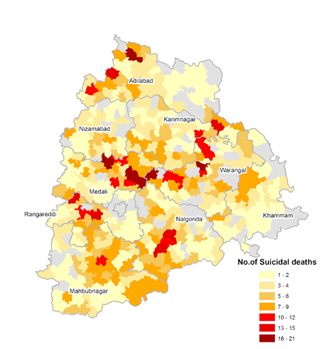Telangana is mainly an agricultural state with 82% of people living in rural areas and deriving livelihood from agriculture directly or indirectly. The average income of Agricultural households in Telangana is Rs. 8951 per month. While the monthly average expenditure is Rs. 6813. Indebtedness is highest in Telangana with 79% households being indebted. The average indebtedness among rural house holds is Rs. 93,500. Telangana recorded third highest farmers suicides (632) in the country in 2018 after Maharashtra (2,550) and Karnataka (1,212). The crisis in agriculture is mainly because of increasing costs of cultivation, increased risk in crop failures. In this context Telangana Govt introduced second budget during its second term today and let see if this will meet the expectations and can solve the problems farming community is facing.
The star program of Telangana government has been Rytu Bandu where govt offered to provide direct income support to farmers upto Rs. 10,000 per acre per year in two instalments and due to non allocation of funds, second instalment was not released last year. While the scheme talks about Rytu bandu as investment support for farmers, it is based on land ownership. As a result tenant farmers who form nearly 15% farming community are kept away from this support. They are the one in crisis and do not have access to any other support systems. This budget there was an expectation that government will announce new measures to be taken to support tenant farmers. The government only allocated Rs. 14,000 cr a Rs. 2,000 higher compared to previous year. So the same situation like last year may repeat.
As told above, indebtedness is a serious problem in Telangana. In absence of access to institutional credit farmers had to access private loans where the interests range from 33 to 120%. Two main reasons for this situation has been due to lack of mechanism to identify the tenant farmers and make institutional loans accessible to the farmers. In 2011 the state government initiated a new mechanism called Loan Eligibility (LEC) Cards which helps them to get access to crop loan only. The numbers of LEC cards issued declined after state formation and last year they were meagre. As a result, they had to resort to private loans with high interest loans and when loan waivers are announced these farmers do not get any benefit. The second main reason problem is the loan waiver scheme which was taken up in four instalments. The instalments make farmers to have pending loan in their account and banks always wait for the years’ instalment to be paid by the government. In the budget government allocated Rs. 6,225 cr and with this state proposes to waive of loans of below Rs. 25,000 in single instalments covering about 5,83,916 farmers (Rs. 1,198 Cr loans) and rest of 34.83 lakh farmers will get loan waiver in four instalments (total amounting to Rs. 24,736 Cr). Hence, we may see the same situation for majority of the farmers facing the same situation again. Government has not proposed any mechanism to increase access to credit to tenant farmers. During 2019-20 among the 41.95 lakh accounts only 18.60 lakh accounts got access to farm credit. The farmers were demanding for a credit guarantee fund. Telangana has more than 600 Farmer Producer Organisations (FPOs) and there was a demand to the state to come up with an FPO policy and allocate additional resources for increasing the credit access and building infrastructure support for the FPOs and the budget is completely silent on this. Instead of strengthening the community based organisations like FPOs the state proposed investments on Rytu Smanvaya Samithis which are mearly a political nominated bodies.
As the risk in agriculture is increasing and crop failure were increasing, the state should take two-pronged approach. One to reduce the risk by moving towards more sustainable models of agriculture. Telangana is has one of the highest cost of production across crops and as a result prices are not remunerative for farmers. The farmers have to move towards reducing their costs by reducing the fertiliser and pesticide use and moving towards organic/natural farming models. Many states in India including Andhra Pradesh, Karnataka, Gujarat, Himachal Pradesh, Madhya Pradesh, Kerala, Sikkim, Uttarakhand etc have significantly made progress in this direction. There is no effort made in Telangana in this direction. In the era of climate change this shift is inevitable to reduce the risk and build resilience in the farming. Second major support system is the crop insurance. The centre has already made PM Fasal Bheema Yojana as an option. Last year many farmers couldn’t not get access to the crop insurance as the state has not released its share of the premium payment. The govt has to allocate the budgets and release in time. There were discussions about state launching a new initiative to cover all farmers under crop insurance but there was no announcement. The budgetary allocation was also not made. We may recall that in the neighbouring state of Andhra Pradesh all the premium for all farmers is paid by the state government.
Marketing problems are multifold and no major initiatives were announced. MARFED is running with losses of over Rs. 3000 cr and no support was announced in the budget. The allocation of Rs. 1000 as market stabilisation fund is very insignificant. There are no proper warehouses and budgetary allocation has not been made instead Rs. 350 cr has been allocated to build rytu vedhikas as meeting places for farmers.
Liquor consumption has become a serious problem in rural areas as major chunk of incomes is going towards this and it is leading to illnesses and social conflicts. Government instead of making efforts to restricting liqor consumption is trying to earn more from this. The income target from liquor sales for 2020-21 has been set at Rs. 11,000 cr.
Rytu bheema is an innovative program initiated by Telangana government and Rs. 1,141 crore and hope the state will make effort to cover all family members under this then only the family head. The Rytu Bheema may be extended to tenant farmers and agricultural workers too who form significant numbers of rural households.
The rainfed agriculture in Telangana is significant and support for spreading crops which consume less water, practices which reduces energy and chemical use is important. Instead government boosts about the increasing area under paddy cultivation even during rabi and building dams as the major solution for the crisis among the farming community. The ecological cost of these dams (as many of them are lift irrigation based), the resultant change in the cropping patterns and the economic burden at the state level due to loans and reducing allocation to other areas which needs priority are not not in the radar of the state government. This is a matter of serious concern and may have significant impacts on farming community and specially small and marginal farmers who form about 85% .
[1] Agricultural Scientist with Centre for Sustainable Agriculture, Hyderabad.



Recent Comments